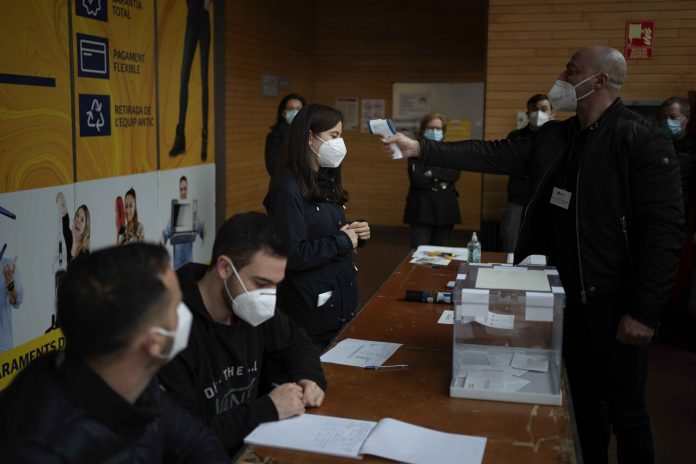
By JOSEPH WILSON
Associated Press
BARCELONA, Spain (AP) — Political parties supporting the secession of Catalonia from the rest of Spain seem to be poised to maintain their hold on that regional parliament after an election on Sunday.
A survey of voters conducted ahead of the election published by Catalonia public television as polls closed suggested that the three parties supporting independence for Catalonia may increase their slim majority in the 135-seat Barcelona-based legislature.
The survey by Catalonia’s public television based on 8,000 phone calls predicted that the pro-secession Republic Left of Catalonia is to likely win the election with between 36-38 seats.
It suggested that the pro-union Socialists would likely come in second with 34-36 seats, followed by the pro-secession Together for Catalonia with 30-33.
Salvador Illa, Spain’s health minister until last month, was the leading candidate on the ticket of Prime Minister Pedro Sánchez’s Socialist Party. Illa was hoping to end the hold that pro-independence lawmakers have held in the regional parliament for the past decade.
Some 5.3 million people were eligible to vote.
The goal of separatists is to not only maintain their slim majority of the Catalan parliament based in Barcelona, but also try to break the 50% barrier of the popular vote for the first time.
The wealthy region, with its own language spoken alongside Spanish, has been the source of Spain’s biggest political crisis in decades since separatists leaders failed in a 2017 secession bid in defiance of court warnings that it was unconstitutional. Several of those leaders ended up in prison, while others fled to other European countries.
Virus fears, rainy weather and the relatively calmer political climate compared to the last election in December 2017 tamped down on turnout. By 6:00 p.m., turnout was 45% compared to 68% four years ago.
Officials are expected to announce preliminary results around 10:00 p.m., but a record number of mail-in votes may mean the full results will take longer than usual.
And a potential future regional government will likely hinge on deal-making between parties that could take days or longer to conclude.
Even if the separatists hold their majority in Catalonia’s regional legislature, there is no guarantee they will overcome the infighting that broke out in their coalition government as the dream of independence remained elusive.
While Together for Catalonia maintains a more radical stance on breaking away from Spain in the short term, the Republic Left of Catalonia has set winning an amnesty from central authorities for the jailed leaders as its top priority for now.



















